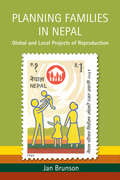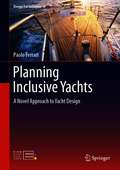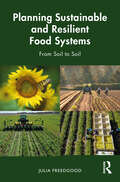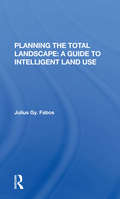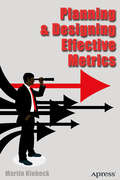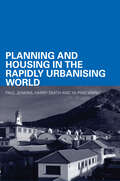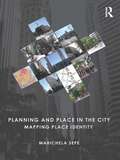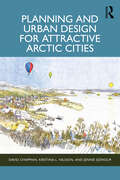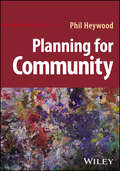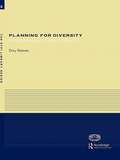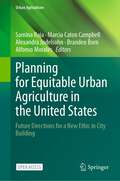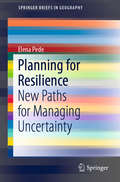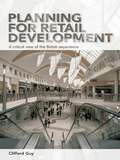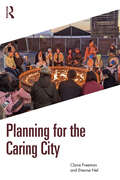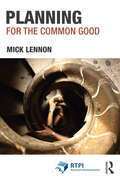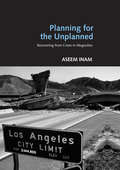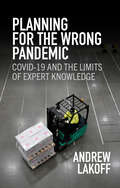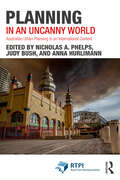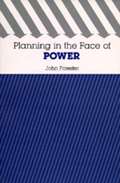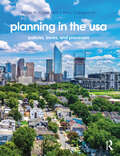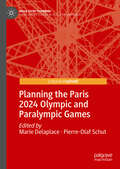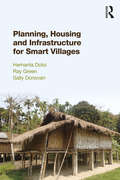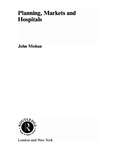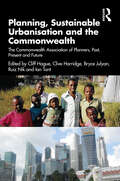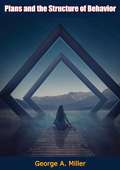- Table View
- List View
Planning Families in Nepal: Global and Local Projects of Reproduction
by Jan BrunsonBased on almost a decade of research in the Kathmandu Valley, Planning Families in Nepal offers a compelling account of Hindu Nepali women as they face conflicting global and local ideals regarding family planning. Promoting a two-child norm, global family planning programs have disseminated the slogan, "A small family is a happy family," throughout the global South. Jan Brunson examines how two generations of Hindu Nepali women negotiate this global message of a two-child family and a more local need to produce a son. Brunson explains that while women did not prefer sons to daughters, they recognized that in the dominant patrilocal family system, their daughters would eventually marry and be lost to other households. As a result, despite recent increases in educational and career opportunities for daughters, mothers still hoped for a son who would bring a daughter-in-law into the family and care for his aging parents. Mothers worried about whether their modern, rebellious sons would fulfill their filial duties, but ultimately those sons demonstrated an enduring commitment to living with their aging parents. In the context of rapid social change related to national politics as well as globalization--a constant influx of new music, clothes, gadgets, and even governments--the sons viewed the multigenerational family as a refuge. Throughout Planning Families in Nepal, Brunson raises important questions about the notion of "planning" when applied to family formation, arguing that reproduction is better understood as a set of local and global ideals that involve actors with desires and actions with constraints, wrought with delays, stalling, and improvisation.
Planning Inclusive Yachts: A Novel Approach to Yacht Design (Design For Inclusion #1)
by Paolo FerrariThis book proposes a novel approach to the design of accessible and inclusive sailing yachts, inspired by the principles of “Design for All.” The goal is to allow anyone, including users with disabilities and individuals belonging to the weaker segments, to sail without barriers. Starting from an analysis of existing pleasure boats, the author identifies a series of factors limiting the accessibility or usability of external and internal spaces. In turn, he discusses the most suitable solutions to each. By proposing an extensive set of design solutions applicable to the confined spaces on yachts, and which comply with the relevant anthropometric and dimensional rules, the book offers a timely snapshot of the potential benefits and applicability of an inclusive approach to yacht design, setting a new reference standard for inclusive and accessible nautical design.
Planning Sustainable and Resilient Food Systems: From Soil to Soil
by Julia FreedgoodCovid-19 was a canary in a mine. It exposed the vulnerabilities of 21st-century food systems but did not create them. Since then, the world has faced a “polycrisis:” a cluster of weather-related crop failures, war-induced food and energy shortages, and import dilemmas with compounding effects. Going forward, we need to plan for more sustainable and resilient food systems that improve environmental outcomes and address economic disparities. But food systems planning is a relatively new discipline and guidance is scarce. This book fills that gap.Where most food systems planning has focused on urban issues, this book takes a holistic view to include rural communities and production agriculture whose stewardship of the earth is so critical to public and environmental health, as well as to ensuring a varied and abundant food supply. Its goal is to inform planning practices and follow-up actions for a wide range of audiences—from professional planners, planning commissions, and boards to conservation districts and Cooperative Extension to the on-the-ground change-makers working to strengthen America’s food and farming systems. Embracing the fact that the U.S. is highly diverse in its people, places, and politics, the book lifts up principles and successful examples to help communities develop strategies based on their unique assets and the needs and preferences of their people.
Planning The Total Landscape: A Guide To Intelligent Land Use
by Julius FabosRapid changes in land use, especially in growing metropolitan areas, have created problems that increasingly indicate an urgent need for techniques and procedures for making intelligent land-use decisions. This book identifies the potential undesirable effects of land-use changes and provides techniques for estimating and minimizing them. Based on several years of research conducted by a team of thirty-four faculty and assistants, the study shows how planners and decision makers can benefit from such contemporary planning tools as remote sensing, statistical analysis, and computer technology, as well as a variety of evaluation procedures. Part 1 describes the problems of contemporary urbanization and offers a set of planning principles and tools for working with the environmental landscape. These principles and tools are the basis of the procedures detailed in Part 2; the assessment procedures, in turn, are an essential part of the two current planning approaches—the holistic, landscape approach and the parametric approach—described in Part 3.
Planning and Designing Effective Metrics
by Martin KlubeckMetrics are a hot topic. Executive leadership, boards of directors, management, and customers are all asking for data-based decisions. As a result, many managers, professionals, and change agents are asked to develop metrics, but have no clear idea of how to produce meaningful ones. Wouldn't it be great to have a fast, simple explanation of how to plan for and then design measurements to improve your organization?Planning and Designing Effective Metrics--an abridged version of author and metrics expert Martin Klubeck's Metrics: How to Improve Key Business Results--provides that explanation and the tools you'll need to make your organization more effective. Not only does this brief book explain the 'why' of metrics, but it walks you through a step-by-step process to create a clear picture of organizational health and how well you satisfy customer needs. This book: Provides a guide for planning and designing useful metrics based on your unique organizational needsOffers the theory behind metrics to help you get exponentially better practical resultsShows how to select and use the proper tools for creating, implementing, and using metricsProvides examples of how to identify, collect, analyze, and report metrics that will be immediately useful for improving all aspects of the enterprisePlanning and Designing Effective Metrics will help you to measure the right things, the right way--the first time. No wasted effort, no chasing data. You will learn how to create valuable measures of organizational success, like repeat customers, customer loyalty, and word-of-mouth advertising. That will help you not only to improve organizational results--you'll also multiply your career opportunities.
Planning and Housing in the Rapidly Urbanising World (Housing, Planning and Design Series)
by Harry Smith Paul Jenkins Ya Ping WangWritten specifically as a teaching text and authored by a team of leading academics in the field, this is the first book to bring together the key issues of rapid urbanisation with approaches to planning and housing. Outlining and explaining core concepts from ‘informal settlements’ to ‘sustainability’, it focuses on the rapid urbanization of developing countries with case studies from Latin America, Asia and Sub-Saharan Africa. The impact of rapid urbanization and associated globalization on land-use and housing is described and analyzed with reference to the particular issues of poverty, health and the environment of these areas. Providing an accessible introduction to the key issues as well as enhancing current theoretical debates and exploring practical applications, this book is an essential resource for students and researchers in this area.
Planning and Place in the City: Mapping Place Identity
by Marichela SepeUnder the influence of globalization, the centres of many cities in the industrialised world are losing their place identity, the set of cultural markers that define a city’s uniqueness and make it instantly recognisable. A key task for planners and residents, working together, is to preserve that unique sense of place without making the city a parody of itself. In Planning and Place in the City, Marichela Sepe explores the preservation, reconstruction and enhancement of cultural heritage and place identity. She outlines the history of the concept of placemaking, and sets out the range of different methods of analysis and assessment that are used to help pin down the nature of place identity. This book also uses the author's own survey-based method called PlaceMaker to detect elements that do not feature in traditional mapping and identifies appropriate planning interventions. Case studies investigate cities in Europe, North America and Asia, which demonstrate how surveys and interviews can be used to draw up an analytical map of place identity. This investigative work is a crucial step in identifying cultural elements which will influence what planning decisions should be taken in the future. The maps aim to establish a dialogue with local residents and support planners and administrators in making sustainable changes. The case studies are amply illustrated with survey data sheets, photos, and coloured maps. Innovative and broad-based, Planning and Place in the City lays out an approach to the identification and preservation of place and cultural heritage suitable for students, academics and professionals alike.
Planning and Urban Design for Attractive Arctic Cities
by David Chapman Kristina L Nilsson Jennie SjöholmThis book takes a deep dive into the design and planning, and unique challenges of settlements in the European Arctic. Attractive Arctic Cities require job opportunities, good societal and commercial services, and importantly, high-quality built environments in order to thrive. The cities of the European Arctic are generally small and sit in sparsely populated regions, with large travel times between places, making them uniquely challenging from a planning and design perspective. The chapters detail the planning process and place-shaping in the Arctic. Emphasis is placed on the importance of urban design, microclimate, cultural heritage, and movement and transport. The objective is to provide an overview for students and practitioners of architecture, urban design and town planning, of the design and planning of Arctic settlements in the European Arctic (Finland, Norway, Sweden) as well as in North America, Canada, Russia, Iceland, Greenland, and China.
Planning for Community
by Phil HeywoodPlanning for Community A comprehensive exploration of community planning that integrates today’s social and economic issues with policy and governance considerations In Planning for Community, distinguished regional and local planner Phil Heywood delivers an insightful examination of the accelerating impacts of social, environmental, and economic changes on community life and organization. He explores the ways in which these changes can be anticipated, planned for, and managed as he reviews and evaluates the nature and challenges of place and interaction faced by traditional and emerging local communities. The book includes discussions of the values, aims, and methods of community planning and the key operations in each of the fields of housing, work, transport, health, and environment. It should also inspire and assist readers to become more involved and influential in the lives of their local and wider communities. Readers will also find: A thorough introduction to methods of inclusion and empowerment enabling effective community management Comprehensive explorations of the ways the values of prosperity, liberty, social justice, and sustainability link to practical community problem-solving Practical discussions of the values, methods, activities, design, and governance shaping community planning Comprehensive, well-grounded, and effective treatments of policy development and practice Planning for Community is an excellent resource for professionals, activists, academics, and students seeking a comprehensive and readable guide to community planning.
Planning for Diversity: Policy and Planning in a World of Difference (RTPI Library Series #Vol. 8)
by Dory ReevesThe practical importance of diversity and equality for spatial planning and sustainable development is still not widely understood. Using international examples, this book shows planners and educationalists the benefits of building in a consideration of diversity and equality at each stage and level of planning.Despite being one of the most diverse and gender balanced of the built environment professions, complacency has been widespread in planning. This book shows why a diverse profession is important and drawing on a wide range of good practice, shows how those involved in planning can develop their sensitivity to and expertise in diversity and equality.
Planning for Equitable Urban Agriculture in the United States: Future Directions for a New Ethic in City Building (Urban Agriculture)
by Alfonso Morales Samina Raja Marcia Caton Campbell Alexandra Judelsohn Branden BornThis open access book, building on the legacy of food systems scholar and advocate, Jerome Kaufman, examines the potential and pitfalls of planning for urban agriculture (UA) in the United States, especially in how questions of ethics and equity are addressed. The book is organized into six sections. Written by a team of scholars and practitioners, the book covers a comprehensive array of topics ranging from theory to practice of planning for equitable urban agriculture. Section 1 makes the case for re-imagining agriculture as central to urban landscapes, and unpacks why, how, and when planning should support UA, and more broadly food systems. Section 2, written by early career and seasoned scholars, provides a theoretical foundation for the book. Section 3, written by teams of scholars and community partners, examines how civic agriculture is unfolding across urban landscapes, led largely by community organizations. Section 4, written by planning practitionersand scholars, documents local government planning tied to urban agriculture, focusing especially on how they address questions of equity. Section 5 explores UA as a locus of pedagogy of equity. Section 6 places the UA movement in the US within a global context, and concludes with ideas and challenges for the future. The book concludes with a call for planning as public nurturance – an approach that can be illustrated through urban agriculture. Planning as public nurturance is a value-explicit process that centers an ethics of care, especially protecting the interests of publics that are marginalized. It builds the capacity of marginalized groups to authentically co-design and participate in planning/policy processes. Such a planning approach requires that progress toward equitable outcomes is consistently evaluated through accountability measures. And, finally, such an approach requires attention to structural and institutional inequities. Addressing these four elements is more likelyto create a condition under which urban agriculture may be used as a lever in the planning and development of more just and equitable cities. This is an open access book.This is an open access book.
Planning for Resilience: New Paths for Managing Uncertainty (SpringerBriefs in Geography)
by Elena PedeGiven the increasing uncertainty due to catastrophic climate events, terrorist attacks, and economic crises, this book addresses planning for resilience by focusing on sharing knowledge among policy-makers, urban planners, emergency teams and citizens. Chapters look at the nature of contemporary risks, the widespread of resilience thinking and the gap between the theoretical conception and the practices. The book explores how resilience implies a change in planning practices, highlighting the need for flexibility in terms of procedures, and for dynamism in the knowledge systems and learning processes that are the main tools for interaction among different actors and scales. Given its breadth of coverage, the book offers a valuable resource for both academic readers (spatial planners, geographers, social scientists) and practitioners (policymakers, citizens’ associations).
Planning for Retail Development: A Critical View of the British Experience
by Clifford GuyWritten by a leading expert in the field, this is the first thorough critical review of retail planning policy in Britain (including Scotland and Wales). It covers recent changes in government policy and guidance, and examines retail policy within a broader economic and social context. Planning for Retail Development explains key events and debates in the evolution of retail planning policy, at central and local government levels, since the 1960s and draws contrasts between the 1980s, a period in which retail developers were encouraged by central government to expand away from town centres, and the more recent emphasis on protection and promotion of town centres as the most appropriate location for new development. The book develops a critical evaluation of past and present retail planning policies, based upon analyses of retailers’ objectives and of typical consumer shopping behaviour. Relationships between retail planning and wider societal concerns, including sustainable development, social inclusion and urban regeneration are also examined and analysed and guidelines for future policy objectives and content are drawn.
Planning for the Caring City
by Claire Freeman Etienne NelAs the world has become increasingly urbanised and planetary well-being ever more threatened, questions have emerged over just what the priorities should be for how we live in cities. Clearly for many the current ways of planning and managing city environments are not working, given so many of their human and non-human inhabitants struggle on a daily basis to maintain their well-being and survival. Different approaches to city development are crucial if they are to be inclusive places where all can thrive. Ensuring that cities are safe and sustainable and provide a level of care for all their residents places a significant mandate on those who manage cities and on planners in particular. This book examines all the parts of the city where care needs to be incorporated, how we plan, create nurturing environments, include all who live there, build sensitively, support meaningful livelihoods, and enable compassionate governance. With planners in mind this book examines why care is needed in the urban environment, and drawing on real world examples examines how it can be applied in an effective and empowering fashion.
Planning for the Common Good (RTPI Library Series)
by Mick LennonAppeals to the ‘common good’ or ‘public interest’ have long been used to justify planning as an activity. While often criticised, such appeals endure in spirit if not in name as practitioners and theorists seek ways to ensure that planning operates as an ethically attuned pursuit. Yet, this leaves us with the unavoidable question as to how an ethically sensitive common good should be understood. In response, this book proposes that the common good should not be conceived as something pre-existing and ‘out there’ to be identified and applied or something simply produced through the correct configuration of democracy. Instead, it is contended that the common good must be perceived as something ‘in here,’ which is known by engagement with the complexities of a context through employing the interpretive tools supplied to one by the moral dimensions of the life in which one is inevitably embedded. This book brings into conversation a series of thinkers not normally mobilised in planning theory, including Paul Ricoeur, Alasdair MacIntyre and Charles Taylor. These shine light on how the values carried by the planner are shaped through both their relationships with others and their relationship with the ‘tradition of planning’ – a tradition it is argued that extends as a form of reflective deliberation across time and space. It is contended that the mutually constitutive relationship that gives planning its raison d’être and the common good its meaning are conceived through a narrative understanding extending through time that contours the moral subject of planning as it simultaneously profiles the ethical orientation of the discipline. This book provides a new perspective on how we can come to better understand what planning entails and how this dialectically relates to the concept of the common good. In both its aim and approach, this book provides an original contribution to planning theory that reconceives why it is we do what we do, and how we envisage what should be done differently. It will be of interest to scholars, students and practitioners in planning, urban studies, sociology and geography.
Planning for the Unplanned: Recovering from Crises in Megacities
by Aseem InamFirst published in 2005. Routledge is an imprint of Taylor & Francis, an informa company.
Planning for the Wrong Pandemic: Covid-19 and the Limits of Expert Knowledge
by Andrew LakoffThe fractious and disorganized governmental response to the coronavirus pandemic in the United States prompted many observers to ask: why was the country—which had the knowledge, resources, and plans to deal with such an event—caught so unprepared? Critics pointed to a number of candidates for blame: a President who was dismissive of scientific expertise and indifferent to the task of leading government response; a fragmented media landscape that enabled misinformation to prosper; a slow-footed health bureaucracy incapable of flexible response; and social disparities that heightened inequities in the impact of disease. Planning for the Wrong Pandemic takes a different approach. Without dismissing such accounts, it begins with the observation that much of the governmental and expert response to the pandemic had been envisioned and planned for in advance. Moreover, many of these plans were implemented in the early stages of the pandemic. As authorities responded to the crisis, they relied on an already-formulated set of concepts and tools that had been devised for managing a future emergency. These pre-existing tools enabled officials to make sense of the event and to rapidly implement policies in response. But they also led to significant blind spots. This book asks: under what circumstances were these planning tools developed? What did they enable experts, officials, and the public to see, and what did they hide from view? And, finally, as we assess the failures in our response to the pandemic and attempt to prepare for “the next one,” to what extent should we take for granted the capacity of these tools to guide future interventions effectively?
Planning in an Uncanny World: Australian Urban Planning in an International Context (RTPI Library Series)
by Nicholas A. Phelps Judy Bush Anna HurlimannThis book places Australian conditions and urban planning centrally within comparative analysis of planning systems and cultures around the world to address issues including urban governance, climate change, transportation planning, regional development and migration planning. Australian urban conditions and their associated planning responses can and often have been seen as unique or exceptional. They are seldom discussed in the same breath as conditions and associated planning systems internationally. Yet, as well as being somewhat different from those elsewhere in the world, Australian urban conditions and planning responses are also somewhat similar. They are uncanny – strangely familiar yet unfamiliar. In this book, Australian urban conditions, and their planning policies and practices are informally compared and contrasted with those existing internationally. If Australian urban planning policy and practice have had limited influence internationally, the partial familiarity of challenges posed by its urban conditions ensure that Australia is a more important global reference point for scholarship and practice than commonly is appreciated. In this book the authors assert the potential and actual originality of urban planning scholarship arising from the Australian context. It will be useful for students and faculty, planners working in Australia, as well as anyone interested in international planning debates.
Planning in the Face of Power
by John ForesterThis book provides a systematic reformulation of the politics of professional practice in the arena of city planning, public policy making, and public administration and management. It has immediate implications for the study of administration and management and for students of administration and planning in schools of social work, education, and public health. While focusing concretely on problems of planning practice (e.g. planners' sources of influence, their difficulties of listening critically, their understandings of the politics of organizations), Planning in the Face of Power brings to bear a wide range of theoretical insights and so integrates social and political theory with the demands of actual practice. Accordingly, the book will be important to practitioners who seek to understand the pressures they face at work as well as social theorists who wish to integrate theory and practice more powerfully, but will also appeal to the general reader interested in gaining an understanding of the practice of planning in the face of the realities of social equality and power.
Planning in the USA: Policies, Issues, and Processes
by J. Barry Cullingworth Roger W. CavesExtensively revised and updated, Planning in the USA, fifth edition, continues to provide a comprehensive introduction to the policies, theory, and practice of planning. Outlining land use, urban planning, and environmental protection policies, this fully illustrated book explains the nature of the planning process and the way in which policy issues are identified, defined, and approached. The new edition incorporates new planning legislation and regulations at the state and federal layers of government and examples of local ordinances in a variety of planning areas. New material includes discussions of • education and equity in planning; • the City Beautiful Movement; • Daniel Burnham’s plan for Chicago; • segregation; • Knick v. Township of Scott; • reforming single-family zoning and regulatory challenges in zoning and land use; • Daniel Parolek’s ‘Missing Middle Housing’; • climate change, mitigation, adaptation, and resiliency; • the drinking water crisis in Flint, Michigan; • sharing programs for cars, bicycles, and scooters; • hybrid electric and autonomous vehicles; • Vision Zero; • COVID-19 relief for housing; • Innovation Districts, Promise Zones, and Opportunity Zones; • the sharing, gig, and creative economies; • scenic views and vistas, monuments, statues, and remembering the past; and • healthy cities, Health Impact Assessment, and active living. This detailed account of urbanization in the United States reveals the problematic nature and limitations of the planning process, the fallibility of experts, and the difficulties facing policy-makers in their search for solutions. Planning in the USA, fifth edition, is an essential book for students of urban planning, urban politics, environmental geography, and environment politics. It will be a valuable resource for planners and all who are concerned with the nature of contemporary urban and environmental problems.
Planning the Paris 2024 Olympic and Paralympic Games (Mega Event Planning)
by Marie Delaplace Pierre-Olaf SchutThis book is the first volume to provide a comprehensive account of mega-event planning for the Paris 2024 Olympic and Paralympic Games. It offers a useful summary of the themes and debates relating to urban planning for the Paris Olympics, based on the results of a research programme (Observatory for Research on Mega-Event) funded by Gustave Eiffel University and Paris Est University and partly carried out with the organisers of the Games and their stakeholders. The authors address all aspects of the bidding process, the organisation of the Games and the construction of the social legacy of the Games.
Planning, Housing and Infrastructure for Smart Villages
by Sally Donovan Ray Green Hemanta DoloiSome 7.3 billion people currently live on the planet. Of these, 3.4 billion live in rural areas. In just a few regions—Latin America, the Middle East and North Africa—less than 50 per cent of poverty is now located in rural areas. But for the rest of the world's regions between 55 per cent and 80 per cent of the poor continue to live in the countryside. Progress is being made, but much of the knowhow needed is not disseminated outside of a small coterie of professionals who work in the area. With urban development attracting a great deal of attention lately, poorer rural areas deserve the same and new knowledge for empowerment of rural communities is urgently needed. This book provides an overview of current thinking and practices that have emerged over the last thirty years for uplifting rural communities in developing economies. Drawing on a body of knowledge across a spectrum of relevant disciplines, this book provides a range of innovative ideas for rural planning, housing and infrastructure development. Governments in many emerging economies, where rural poverty is often most acute, have attempted to improve livelihoods. Approaches and techniques that have been used for urban development are often not applicable to rural communities. Studies show that money allocated for rural development is often not effectively spent due to distance, lack of infrastructure, lack of education, poverty and other factors. Meanwhile, the gap in development between the city and country continues to grow, sometimes leading to social and political instability, in both developing and developed countries. This book seeks to provide a guidebook for meeting such challenges. Through in-depth enquiry of global practices and thinking about rural development, and selected case studies, the authors argue that careful consideration must be given to incorporating issues of resilience, resourcefulness and the involvement of communities at grassroots levels in realising the transformation of rural settlements into Smart Villages.
Planning, Markets and Hospitals
by John MohanImproving access to hospital services has been a goal of public policy in Britain for over seventy years, but the means by which this goal is to be attained have changed significantly over time. Drawing substantially on original research, lanning, Markets and Hospitals represents a systematic attempt to access the strengths and weaknesses of different forms of planning and coordination of hospital development.The period covered includes: services prior to 1948; wartime hospital policy; the successes and failures of the mixed economy of health care in the inter-war period; the national hospital plan of 1962 and ultimately the market based reforms of 1991 and the changes since.This book makes a fresh contribution to enduring debates about planning and regulation of health care, about the governance of welfare services and about the appropriate role for voluntary, commercial and charitable provision of services. It reinterprets previous histories of hospital policy and questions whether current policies will reconcile competing goals of equity and choice.
Planning, Sustainable Urbanisation and the Commonwealth: The Commonwealth Association of Planners, Past, Present and Future
by Cliff Hague Clive Harridge Bryce Julyan Ruiz Nik Ian TantBy 2050, an additional 2.5 billion people will be living in the world’s towns and cities, almost 50% of them in the 56 Commonwealth countries. To a significant extent, the future of the planet hangs on how cities and human settlements are managed. It is in our cities that the emissions creating climate catastrophe are stoked and where change can – and must – make a difference at scale. Food security, water, basic services, migration, shelter, jobs, environment: sustainable urbanisation is about changing direction to strive for a fairer and less environmentally damaging future. This well-illustrated book by authors from around the Commonwealth tells how the Commonwealth Association of Planners across five decades has campaigned to make a difference. It also looks ahead, scoping the urgent, practical action that is now required.
Plans and the Structure of Behavior
by George A. Miller Eugene GalanterBy 1960, psychology had come to be dominated by behaviorism and learning theory, which emphasized the observable stimulus and response components of human and animal behavior while ignoring the cognitive processes that mediate the relationship between the stimulus and response. The cognitive phenomena occurring within the "black box" between stimulus and response were of little interest to behaviorists, as their mathematical models worked without them. In 1960, the book "Plans and the Structure of Behavior," authored by George A. Miller, Eugene Galanter, and Karl H. Pribram, was published. In this volume, Miller and his colleagues sought to unify the behaviorists' learning theory with a cognitive model of learned behavior. Whereas the behaviorists suggested that a simple reflex arc underlies the acquisition of the stimulus-response relationship, Miller and his colleagues proposed that "some mediating organization of experience is necessary" somewhere between the stimulus and response, in effect a cognitive process which must include monitoring devices that control the acquisition of the stimulus-response relationship. They named this fundamental unit of behavior the T.O.T.E. for "Test - Operate - Test - Exit".—Print ed.
